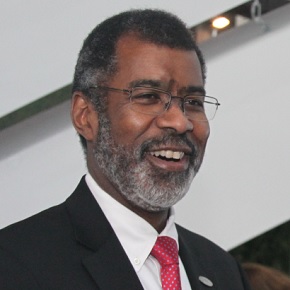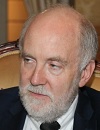 |
||
|
Rosatom took part in the Russia-Africa Summit Communications Department of ROSATOM, PUBLISHED 26.10.2019 ROSATOM took part in the Russia-Africa Summit, which ended on October 24 in Sochi. ROSATOM’s Director General Alexey Likhachev took part in a series of bilateral meetings of the President of the Russian Federation V.V. Putin with the leaders of Egypt, Namibia, Ethiopia, South Africa and Algeria. In addition, during the Summit, ROSATOM signed a number of agreements. In particular, on October 23, a Memorandum of Cooperation was signed between ROSATOM and the Peoples' Friendship University of Russia (RUDN University). This agreement will allow combining the efforts of ROSATOM and its partner universities in terms of promoting Russian nuclear education abroad, mainly in African countries. “The cooperation between the State Atomic Energy Corporation ROSATOM and RUDN will enable us to develop international inter-university cooperation in Africa, and will increase interest on the continent in Russian nuclear technologies, as well as Russian nuclear education,” said RUDN’s Rector Vladimir Filippov. On the same day, Russia and Ethiopia signed an Intergovernmental framework agreement on cooperation in the peaceful use of atomic energy. The document was signed by ROSATOM’s Director General Alexey Likhachev and Ethiopia’s Innovation and Technology Minister Getahun Mecuria Kuma. The agreement will serve as a springboard for active dialogue between the two countries in the field of nuclear technologies and will allow to begin the implementation of selected joint projects. Also on October 24, Russia and Rwanda signed an agreement to construct the first Centre of Nuclear Science and Technologies in Rwanda. The agreement was signed by ROSATOM CEO Alexey Likhachev, and Rwanda’s Minister of Infrastructure Claver Gatete. The CNST is expected to comprise of a multi-purpose research water-cooled reactor with up to 10 MW capacity, and will be equipped with laboratories and functional units for carrying out a whole range of scientific research. The Center will allow to do research in the field of radiation biology, and to produce radioisotopes in Rwanda for widespread use in diagnosing and treating cancer. On the first day of the Summit, under the framework of the business program, the Panel discussion "Contribution of Nuclear Technologies in the Development of Africa" was held, organized with the support of ROSATOM. The panel discussion was attended by ROSATOM’s Director General Alexey Likhachev, the Head of the Zambia Atomic Energy Agency Roland Msiska, the Minister of Infrastructure of the Republic of Rwanda, Claver Gatete, the Minister of Innovation and Technology of Ethiopia Getahun Mekuria Kuma and the others. The moderator was Head of Corporate Citizenship and Inclusion and Diversity Lead at Accenture Khethive Nkuna. Speaking at the session, Alexey Likhachev noted that today, affordable and stable energy is the basic condition for achieving sustainable development goals. He noted, in particular, that nuclear energy acts as an infrastructural driver of the national economy, since 1 US dollar invested in the project turns into 2 dollars in the form of local factories' order. “We can make a qualitative breakthrough in Africa in terms of technological development and the use of nuclear technology in the next few years,” the head of ROSATOM emphasized. First Deputy Director General for Corporate Development and International Business of ROSATOM Kirill Komarov took part in plenary session “Russia – Africa: revealing the potential of cooperation”. During the plenary session, it was noted that ROSATOM is already cooperating with more than 20 African countries, in particular, building the largest "El-Dabaa" NPP on the continent in Egypt with an installed capacity of 4.8 GW. Large uranium projects in Tanzania and Namibia are at different stages of implementation. In addition, ROSATOM is actively involved in a project implementation to build a center for nuclear science and technology based on a research reactor in Zambia. Developing such projects, ROSATOM continues the tradition of promoting science and innovation in Africa. President of Rusatom Overseas Evgeni Pakermanov took part in the "Doing Business in Africa: Challenges and Opportunities" session, where he spoke about the experience of ROSATOM in projects' implementation on the African continent. In his speech E. Pakermanov paid special attention to the features of the implementation of nuclear projects in the African countries and highlighted several key conclusions, including: lack of the required number of qualified personnel and infrastructure. “We are ready to provide extensive support to our African partners, seek coordinated decisions in these courses and contribute to the stable phased development of national nuclear energy programs,” he emphasized. The exhibition stand of ROSATOM at the Forum outlined its innovative solutions based on nuclear technologies, proposed in Africa. The Forum was visited by many high-ranking participants of the event. The Africa-Russian Economic Forum was held in Sochi on October 23-24, 2019. According to the organizers, the event has become one of the major events in the history of African-Russian relations. Heads of all 54 states of the continent were invited to the Summit. The organizer was the Roscongress Foundation. Other news: 450 nuclear units are operating in the world Another 52 units have the status of the being built one. Russia and China signed the Executive contracts for the construction of Tianwan NPP and Xudabao NPP Package defines the major lines to develop cooperation between Russia and China. WANO members vote to establish a new Branch Office and Support Centre in China WANO has defined a high-level, three-phase deployment model for the office in Shanghai. |
Hero of the day 
William D. Magwood, IV: We are looking for ways to encourage young people I think our members have understood that one of the biggest issues going forward is making sure that we have a new generation of young people that can take up the work of developing, deploying and operating nuclear facilities in the future. INTERVIEW
Matthew Bunn OPINION
WANO Last news:
|
Licence Р В Р’ВР В Р’В» №ФС77-30792. ATOMINFO™ trademark.

